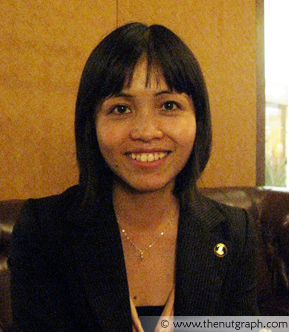
Teo Nie Ching (all pics below courtesy of Teo Nie Ching)
Teo recalls how she was first invited to stand for elections as an MP. “It was just after Chinese New Year. I was in my office [when] I received a call from Tony Pua, whom I had met before at functions. I greeted him, ‘Happy Chinese New Year! Where is my angpow?’ And he replied, ‘Ok, I have an angpow for you — the candidacy of the Serdang parliamentary seat.’”
Teo said she had to resign from the law firm she was practising in to stand as a candidate but her boss gave her the option to return if she lost. “My boss expected me to lose the election,” Teo said, Serdang being a former MCA stronghold. “But who would have known that I and so many other [opposition] candidates would win.”
Life is certainly not the same and Teo has less time now with family and friends since being elected. But she is positive when asked why she is willing to make the sacrifice. “Every occupation involves expectations that need to be met,” Teo says. “In meeting those expectations, you may need to sacrifice some things but you also gain other things. So to me, these ‘sacrifices’ are the tuition fees I need to pay to learn all that I have so far.”
The Nut Graph interviewed Teo on 14 July 2010 at Parliament.
TNG: Where were you born and where did you grow up?
Teo: I was born in Kampung Bindu, Batu Pahat in January 1981. I was born at home. The nurse came to the house to help my mother to give birth. I’m the third out of four children.
What are some of your strongest memories of the place where you grew up?
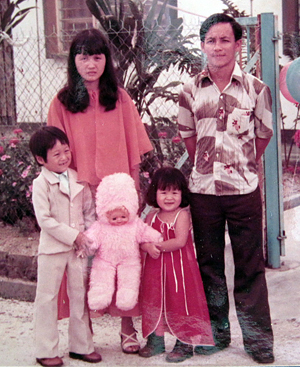
Teo's family (before Teo's birth)
In my kampung, it was very different, especially when I was growing up. We locked the door only at night. During the day, whether or not you lock (the door), it’s no big deal.
Here in KL, not every taman has a playground. Even if you go to the playground, an adult needs to accompany the children. For us, we just roamed anywhere in the kampung. Of course, it’s better to let your parents know where you’re going but they won’t really be nervous if they didn’t know exactly where we were. Maybe in the evening, if they think it’s getting late, they might go around the kampung shouting your name, “Where are you? Ey, time to go back.”
I only realised how lucky I was after I came to KL. Even though we didn’t have Playstation or lots of gadgets, we had a lot of freedom.
Can you trace how your family came to Malaysia?
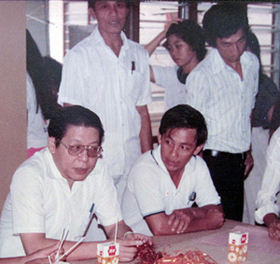
Teo's father (right) seated next to Lim Kit Siang, 1984
On my mother’s side, my grandfather came here from Fujian in China when he was about 12 or 13. He was the youngest son and all his siblings remained in China. Until recently, he still tried to go back once a year. But he’s very old now. His siblings have also passed away. He’s settled in Johor and owned a timber company. Actually, my father worked for him and that was how my father met my mother. Eventually, my father took over the timber company from my [maternal] grandfather.
Are there any stories that you hold onto from your family?
My father was from a poor home. I remember he told me about how his father passed away when he was about 15. My grandfather was a rubber tapper. One day, he didn’t come home, even though it was late, about 8 or 9am. In those days, they go out as early as 4am to tap rubber. My father and uncle went to look him and found him in the rubber estate lying on the ground. A rubber tree had fallen on top of him and he had died.
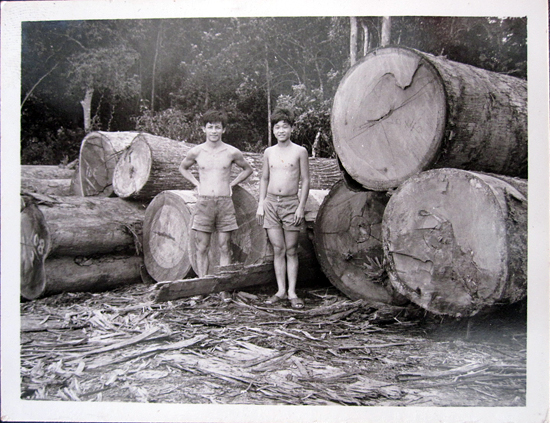
Bekok, Segamat: the place of work for Teo's father, 1978
Another family story is about my father’s aunt. My great-grandmother had three sons and one daughter. When her daughter was about 12, she was boiling water but she was shocked by people playing firecrackers outside. [She upset the pot] and the boiling hot water spilled all over her. At that time, maybe the medicine was not so good so eventually she passed away. Since then, my great-grandmother [gets] very upset and really [dislikes it when] people play with firecrackers.
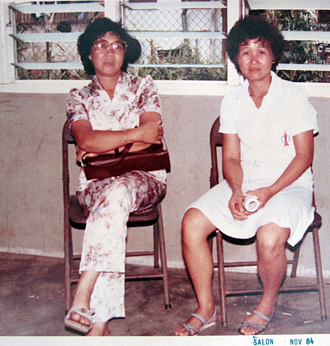
Teo's mother (right) with Lim Kit Siang's wife, 1984
I believe many people have similar experiences. I think at the beginning, when Malaysia was not so well developed, many families lived in poverty. Medicine was also not widely available.
I believe every family has had their share of suffering. Now, in modern Malaysia, we have schools, hospitals, medicine. After our families have gone through all this, I wonder sometimes, do we really cherish all that we have?
Are there any aspects of your identity that you struggle with as a Malaysian?
In school, I would wonder sometimes, why are we not treated equally in this country? When I was young, I didn’t declare myself as Malaysian, I would just say I’m Chinese. Not that I’m from China, but because I went to a Chinese [language] school and everything we learnt or read was in Chinese.
When I went to university, especially when I went overseas, that’s when I realised, I’m not just Chinese, I’m also Malaysian. I started to look at Malaysia as a country, where I was born and where I grew up.
I started to question, how well do I know my country? I could name the prime ministers so far, but about what each of them has done? What about other parts of Malaysia other than Johor, like Sabah and Sarawak? I knew there were Kadazan in Sabah and Iban in Sarawak, but what about their cultures? Even for Malay culture, what is Hari Raya all about? People overseas would ask me to tell them more about my country and I realised how little I knew. There was so much to learn about my own country and I’m still learning.
Describe the kind of future you would like for yourself and for future generations.
I hope that future generations [do not have to deal] with being treated differently in Malaysia. I remember in Chinese school, our teachers would share with us about the struggles the Chinese in Malaysia went through. They impressed on us to cherish everything the Chinese have worked for.
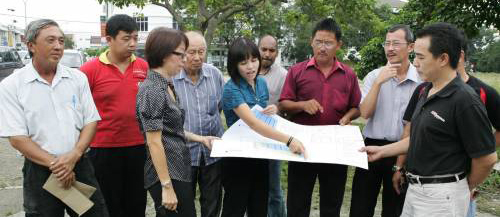
Teo Nie Ching at work
I’m also very concerned about corruption. We will have to deal with a [financial] crisis in the future. Our petroleum revenue will run out by 2014 or 2015 and we are in very high debt. Can we do well in the next five years, ten years, 50 years?
To me, whether we are a developed or developing country, I don’t really mind. It’s great if we are a developed country, but I think what is more important is the quality of life. It doesn’t necessarily mean that if you earn more, your quality of life is better. To have a caring society, one where we respect each other, that is also very important. Yes, it would be a plus if we became a high income nation but we don’t need that to happen for us to be a harmonious and happy nation. I believe that is more important.
没有评论:
发表评论